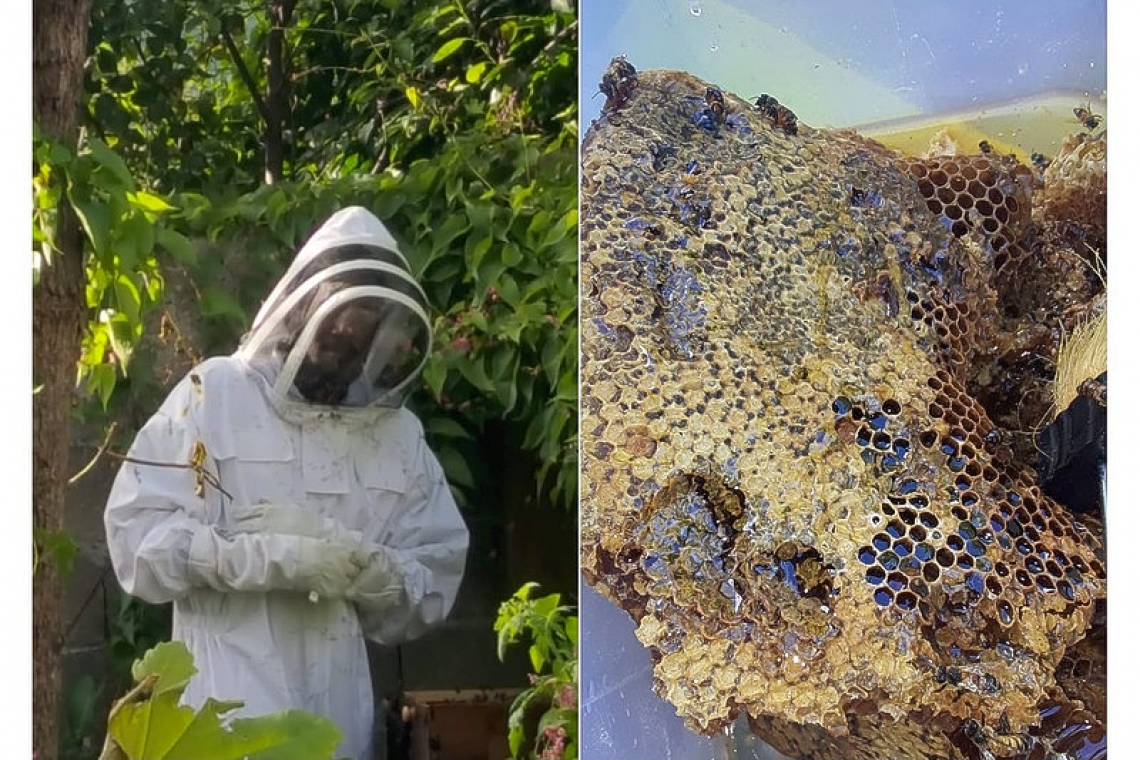Bees are very important to our ecosystem – without bees, humans would soon go extinct, yet we generally know very little about the black and yellow striped insects. But with all this time at home, many of us have rediscovered the value of nature by gardening, hiking, fishing, or maybe even beekeeping.
The Weekender asked local beekeeper Dwain William for all the buzz on this essential species and their care.
Tell us a little more about yourself. Who are you?
Born and raised on this beautiful island St. Maarten, I am a chef and a very passionate person about nature. I love gardening – and beekeeping comes right along. Currently, I am the chef at the MPC school canteen and do outside catering on occasion – Iz Di Handz is the brand.
Why did you start beekeeping? What does beekeeping entail?
Beekeeping came into the picture after Hurricane Irma when time was on my hands and I was just looking for something to keep myself busy. As a child, I always had a fascination for bees.
It was August and my birthday was coming up, so after watching some YouTube videos, I decided to buy myself a beehive for my birthday. September came and Irma came along. I saw the disaster on the island and started to feel sad for the bees, so I decided to take it more seriously and do something about it. I started doing research and reading books about beekeeping and am planning to do an online course now.
Being a beekeeper is hard work and it's not as rewarding as one would think on St Maarten, seeing our agriculture status. You really have to have a passion for it. Beekeeping is having a beehive and frames to maintain a bee colony. A beekeeper (or apiarist) keeps bees in order to collect their honey and other products that the hives produce such as beeswax, propolis, flower pollen, bee pollen, and royal jelly.
Why are bees so important?
Bees are very important to our environment – they pollinate a third of the food we eat and they flower 80% of the plants. Pollination is crucial because many of our vegetables, fruits and the crops that feed our livestock rely on it, so without it, we could go hungry.
How many beehives do you have and how does that work? Do you have different breeds?
Right now, I have two beehives. One year ago, I had four – but seeing the conditions on SXM, it is very difficult for the bees to survive because of the dryness and because there is not enough food for them to eat. In a hive, you have three type of bees: the queen, the drone (males) and the workers (female).
How do you protect yourself from being stung? Have you ever been stung?
Wearing a proper bee suit can protect you from being stung, but even with that, they still find a way sometimes. Getting stung is a normal thing, but after understanding and working with the bees, it gets better. It’s always good to remain calm while working with bees to avoid agitating them, because when a bee stings you, it dies.
Is the beekeeping risky for your surroundings, like for your neighbours for example?
No, not really. As long as you’re not bothering them; they won't bother you. Honeybees are aggressive when disturbed and when their hive is full of honey. I have bees in my backyard and you wouldn't even know.
Do you harvest honey? How many bees does a little bit of honey require?
Yes, once a year. It depends how much honey it has because the bees also produce honey for themselves to eat – so taking all can send your bees into starvation. It takes 12 worker bees to make a teaspoon of honey and a worker bee’s lifespan is between four and six weeks.
What is your advice for people interested in beekeeping?
Go for it. The sad thing about that is that we need more agriculture on the island – more people planting, taking care of nature, keeping the island clean, and taking care of your surroundings.
Any tips for bee stings or unwanted beehives?
Yes, there are certain scents, like mint, tree, citronella, cinnamon and mothballs, that keep away bees. These are stuff you can use around your house if you want to keep bees away.
How can we help protect the bees on St. Maarten?
By planting fruit trees and bee-friendly plants and flowers. Avoid using pesticides or use bee safe pesticides. If you notice bees in your yard on a regular, keep a water supply with rocks or something that they can land on to have a drink. Support your local beekeeper; sponsor a hive. Protect swarms – don’t spray them. Instead, call your local beekeeper and spread awareness.
For more information on bees or beekeeping, you can contact Dwain via WhatsApp at +1 (721) 522 8783 or email at This email address is being protected from spambots. You need JavaScript enabled to view it.. And don’t forget to stay updated for his locally sourced honey in June-July!







